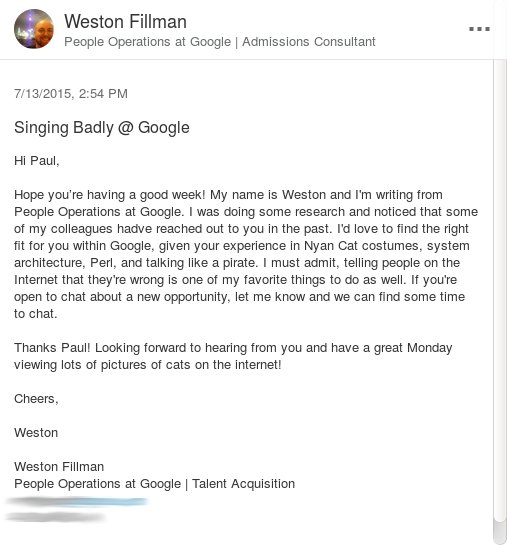6 job search tips from the pros to help get you hired
Here are a few job hunting tips from the experts. Justin Sullivan/Getty Images - A A + Listen Looking through job postings and applyin...
https://interviewquestions68.blogspot.com/2017/08/6-job-search-tips-from-pros-to-help-get.html

Here are a few job hunting tips from the experts.
Justin Sullivan/Getty Images A A
Listen
Looking through job postings and applying for work can be draining – especially when you don’t hear back from anyone who’s hiring.
Don’t despair, though. We talked to a few experts who shared their best practices to land meaningful employment. And there are definitely things job-seekers could improve on.
For starters, Canadians seem to have a hard time selling themselves.
A LinkedIn survey released this week revealed:
- More than half (53%) of Canadian respondents said it feels like they’re bragging if they talk about their professional successes.
- Only 29% feel proud to share them (compared to 40% of Americans). Women find it more challenging than men.
Fifty-five per cent of those surveyed rather discuss their colleagues’ achievements over their own. This brings us to tip number one.
1. Embrace the humblebrag
“If you’re having a hard time figuring out what makes you a great candidate, then sit down with someone you trust,” suggested Julie Dossett, communications lead at LinkedIn Canada.
“Ask them: ‘Hey guys, how would you introduce me? What would you say about me?’”
Don’t look at it as boasting. Think of it as improving the one shot you’ve got to make a great impression, Dossett said.Incorporate their praise into how you sell yourself and stand out to prospective employers (more on that later).
While you’re at it, she added, get over your fears and ask your colleagues to write you a recommendation on LinkedIn. It can just be a short statement about how well you work together.
“You’d be amazed at how receptive people are.”
And don’t wait until you’re looking for a job to do this.
“You just don’t know when that opportunity’s going to knock,” Dossett said. “When the door opens you better be ready to walk through.”
2. Have a solid elevator pitch
Think of the elevator pitch as the “summary” on your LinkedIn profile or resume, as well as something you can bust out if you bump into someone who’d love to work for.
WATCH: How to attract employers with your resume and LinkedIn profile

The LinkedIn survey asked employed respondents how they’d feel if they met their dream employer by chance tomorrow. Barely half thought they could confidently and effectively describe their experience and achievements on the spot.
One in six said they would panic. You don’t want to be you.
Your elevator pitch should touch on three categories, according to Dossett:
- Your most important accomplishments – write a sentence for each one, with the goal of articulating what you brought to the table.
- Your values and passions – this is an insight into your personality.
- Your “superpower” – something that makes you unique; it can be a skill or fun fact.
Just be authentic. It’ll go a long way. In some cases, it may even score you a job offer from Google.
That’s what happened to Australian scientist Paul Fenwick this month.
Recruiter Weston Fillman was a fan of the quirky skills Fenwick listed on LinkedIn, which included: talking like a pirate, watching pictures of cats and dressing in Nyan Cat costumes.
3. Network
Any expert will tell you putting yourself out there is one of the most important parts of the job search.
Dianne Hunnam-Jones, Canadian president for recruiting firm Robert Half, has the following suggestions: attend relevant networking events, join industry associations, reach out to old employers, and alumni.
“[They all] provide the opportunity to expand your network and help you keep up to date on trends in your area of expertise, and an ear to the ground for potential job openings.”
Volunteering is another great way to meet people and potentially gain experience in your field, she said.
WATCH: Job search techniques that don’t work

4. Personalize
Take the time to tailor your cover letter and resume to each workplace you apply — this is super important.
“Tailored content and proof of ability is what wins,” said Adrienne Tom, a Calgary-based resume writer and interview coach.
Applicant tracking systems will often screen applications that are submitted online nowadays. which makes customization more important than ever.
“Ensuring a resume is keyword-rich and addresses the specific needs of each job posting will help increase the success rate,” Tom said.
Try to be specific in your resume, offering tangible facts and figures rather than buzzwords.
5. Prepare
Research each company you apply to and prep for your interview.
“Many simply wing it in the moment,” Tom said. “If you haven’t interviewed for a while and you are not well practiced in interviewing, it will show.”
She suggests thinking of some career stories to share during the interview.
“Not just answers to anticipated questions, but engaging stories that clearly demonstrate the challenge, action, and result of different scenarios where a specific skill set was applied.
“Everyone loves a good story and this strategy is a great technique to capture, and keep, an employer’s attention during an interview.”
WATCH: How to ace your next job interview
6. Send a thank-you
Experts say it’s good form to send a thank-you letter after an interview. Tom prefers a hand-written note, but email can work as well.
You don’t want to send it right away, said Dave Banns, a senior recruitment consultant at The Headhunters.
Wait 24 to 48 hours, he advised, and include something you like about the role or the company.
“It just shows the person has thought this through.”




